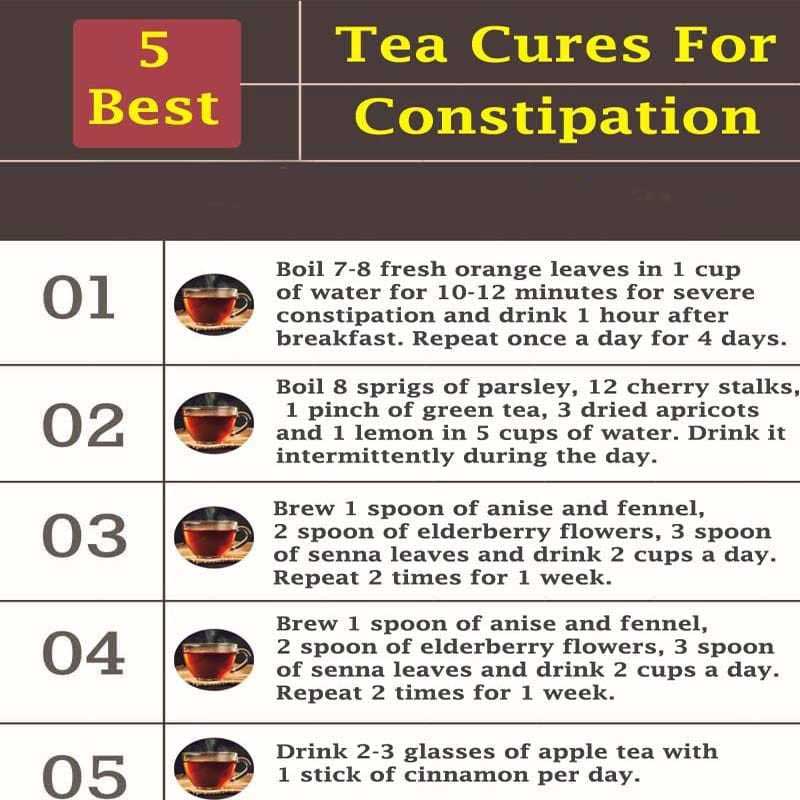Constipation is a common digestive problem that occurs when you are not functioning properly your intestines. It is a symptom, not a disease, meaning that a person has three or fewer bowel movements per week.
It more affects women and the elderly, it is common during pregnancy. Its severity depends on the person; it takes a short time in many people, but for some is a chronic problem that causes severe pain, affects quality of life. Causes include malnutrition, dehydration, changes in routine, physical inactivity.
It can also cause constipation medical conditions such as diabetes, hormonal disorders, hypothyroidism, genetic factors, and depression.
Diet and lifestyle changes, such as increasing daily fiber intake, drinking plenty of water, exercising more, are treatment methods that can be applied in the first step for constipation. Laxatives should be used as a last resort.

What Are The Best Herb And Teas for Constipation?
Foods that are good for constipation include flaxseed, legumes, whole grains, spinach, leeks, cabbage, figs, apricots, kiwi, vegetables and fruits that are high in fiber.
7 Best Herbs Cures For Constipation
1. Bring 6 dried apricots, 5 prunes, 1 tbsp oatmeal, 1 tbsp olive oil, 1 slice lemon mixture to boil with half a glass of water and mash to the consistency of paste. Eat 1 tablespoon each morning on an empty stomach and drink over 1 cup of warm water.
2. Soak a few dried apricots and plum plums in 1 glass of water in the evening, and drink apricots and plums on an empty stomach in the morning. Repeat every morning.
3. Pour the flaxseed in the mortar and mix it with low-fat yogurt in the morning on an empty stomach.
4. Soak 1 kg of barley in the water in the evening. Boil in the morning, add 2 zucchini, 1 stalk leek, 8-10 sprigs of spinach, 1 celery stalk, 1 tablespoon of olive oil, 1 pinch of salt and cook. Drink this soup on an empty stomach in the morning.
5. Throw 2-3 dried figs chopped into 1 cup of olive oil and eat them in the evening.
6. Pass the chopped 3 cups of dates, 1 cup of dried apricots, 1 cup of prunes, 6 cups of water, half a glass of lemon juice and 1 teaspoon of olive oil through the robot. Keep the mixture in the cupboard and drink it throughout the day.
7. Whisk half a glass of lean yogurt in a bowl. Then add 1 bottle of mineral water, 2 tablespoons of lemon juice and half a teaspoon of mint in the bowl and continue mixing. You can consume half an hour from breakfast and 2 hours a day 2 hours before bedtime.
9 Best Tea Cures for Constipation
1. Boil 7-8 fresh orange leaves in 1 cup of water for 10-12 minutes for severe constipation and drink 1 hour after breakfast. Repeat once a day for 4 days.
2. Boil 8 sprigs of parsley, 12 cherry stalks, 1 pinch of green tea, 3 dried apricots and 1 lemon in 5 cups of water. Drink it intermittently during the day.
3. Drink 2-3 glasses of apple tea with 1 stick of cinnamon per day.
4. Brew 1 spoon of anise and fennel, 2 spoon of elderberry flowers, 3 spoon of senna leaves and drink 2 cups a day. Repeat 2 times for 1 week.
5. 1 spoonful of thyme, 2 spoonful of chamomile flowers and rhubarb root, 3 spoonfuls of senna and drink 1-2 glasses a day. Repeat 2 times for 1 week.
6. Brew 1 spoon of fennel and chamomile flowers, 5 spoonfuls of psyllium seeds and repeat for 1 cup for 3 cups a day.
7. Brew 1 spoonful of cauliflower and flaxseed, 1 spoonful of licorice and fennel and repeat for a week, for 3 cups a day.
8. Boil 1 pinch of corn tassel, 1 pinch of nettle, 8-10 cherry stalks, 8-10 fresh parsley leaves, 3-4 bay leaves, half a glass of chopped white cabbage in 1 liter of water, drink 2-3 cups a day.
9. Put cinnamon, fennel, coriander, anise, spinach root in 1 cup of boiled water, and brew for 5 minutes. Drink 1 glass 2 times a week in the evening.

Which Foods Are Good For Constipation?
Dried Fruits: Eating dried apricots, figs, plums and drinking warm water on an empty stomach in the morning makes the intestines work. You can consume dried fruits raw, as well as use in salads, cereals, oatmeal, desserts, and stews, and you can make the compote.
Fiber Foods: Such as legumes, grains, oats, nuts, almonds, sweet potatoes, beets, leeks, spinach, cabbage, avocados, celery, carrots, onions, cucumbers, pumpkin, flaxseeds, carob, to get the fiber your body needs every day, fiber foods; eat fruits such as apples, pears, kiwi, grapes, oranges, grapefruit, tangerines, plums, cherries, strawberries, cranberries.
Olive Oil: Drinking 1 teaspoon of olive oil on an empty stomach; Consuming olive oil with thyme and olive oil softens the intestines.
Which Medicinal Plants Are Good For Constipation?
Medicinal plants can treat constipation without medication thanks to laxative properties.
Drinking 1 cup of herbal tea after meals relaxes the digestive system, relaxes muscles, triggers bowel movements, eliminates bloating and cramps.
Fenugreek seeds, peppermint, fennel, rosehip, ginger, dandelion, echinacea, lemon balm, green tea, senna, licorice, marshmallow root, chamomile, coriander, thyme are the herbs used in the treatment of constipation.
Senna should be used in the evening and should be used no more than 2 times a week. Excess can cause intestinal laziness.
Foods That Reduce Constipation
- Dried plum
- Spinach, Brussels sprouts, broccoli
- Topinambour
- Chicory
- Artichoke (Research shows that artichoke regulates bowel movements thanks to its prebiotic effect)
- Rhubarb (Intestinal stimulant is a green leafy plant. Its leaves are not eaten, but stems can be boiled. It can be added to oats or muesli.)
- Beans, peas, lentils (can be boiled and added to soups or salads.)
Causes Of Constipation
Constipation is often the result of the slow movement of food within the digestive system. If contract weak muscles in the colon, stool moves slowly, loses water and waste accumulates in the intestines.
Some causes of constipation include:
Lack of Fiber in Diet: Not to consume foods with fiber such as vegetables, fruits, whole grains; to consume high amounts of meat, dairy products, eggs, refined sugar.
Using Too Many Laxatives And Enema: If you use laxatives too often, your body may forget to work on its own and become addicted to them.
Not Going To The Toilet When Necessary: Waiting for bowel movements makes defecation more dry and difficult.
Medical Conditions: Parkinson’s disease, spinal cord injury, stroke, neurological disorders such as multiple sclerosis, hypothyroidism, hypercalcemia, diabetes, chronic kidney disease, such as metabolic disorders, colon cancer, diverticulitis; lupus, scleroderma as well as systemic disease; irritable bowel syndrome (IBS) or blockages in the intestines.
How Does Disappear?
Simple changes in diet and lifestyle help treat constipation. If these changes don’t work, you may need to see a doctor.
Laxatives work in most cases but should be used carefully and only when necessary. Laxatives should be used as a last resort.
If you have severe pain, consult a doctor blood in the stool, or constipation that lasts longer than three weeks.
What To Do To Get Rid Of Constipation?
If the tests show no illness or obstruction, there are several ways to alleviate symptoms without using medication:
Make changes to your diet: fiber increases bowel movements and prevents constipation. Increase your fiber intake by adding apricots, prunes, dried fruits such as figs; vegetables, legumes, wheat bran, oats, flaxseed to your diet.
Consume at least five servings of fruit or vegetables each day; limit processed foods, dairy products, and meat. Choose white meat or fish meat instead of red meat.
If the tests show no illness or obstruction, there are several ways to alleviate symptoms without using medication:
Make Changes To Your Diet: Fiber increases bowel movements and prevents constipation. Increase your fiber intake by adding apricots, prunes, dried fruits such as figs; vegetables, legumes, wheat bran, oats, flaxseed to your diet.
Consume at least five servings of fruit or vegetables each day; limit processed foods, dairy products, and meat. Prefer white meat or fish meat instead of red meat.
Increase Your Activity: Stay as active as possible and try to exercise regularly. Walking fast for 30 minutes a day increases bowel movements.
Improve Your Toilet Routine: Give yourself plenty of time to use the toilet regularly. Being regular is different for every person; two a day for some and three a week for others is normal. At the same time every day, preferably after meals, go to the bathroom, do not delay your need.
Drink Plenty Of Fluids: Drinking enough water, juice, soup, natural yogurt juice can help with regular bowel movements. Try to drink 6-8 glasses of water a day.
Emergencies
If simple changes do not respond, contact a doctor if you have symptoms such as blood in the stool, painful bloating in the abdomen, weight loss, extreme fatigue. It can be indicative of an emergency that requires medical attention, such as gastro-intestinal puncture, intestinal obstruction, appendicitis, pancreatitis, mesenteric.
Tar-colored stools can be indicative of peptic ulcers, anal cracks, Crohn’s disease, colon cancer.
Most constipation rarely causes complications, but if it lasts longer, hemorrhoids, intestinal incontinence (fluid stool leakage) may develop.
Constipation In Infants And Children
To stimulate your baby’s intestines, move your legs as if you were riding a bike and gently massage your belly. Don’t force your child to eat and give them plenty of time to use the toilet, encouraging them when they use the toilet.
